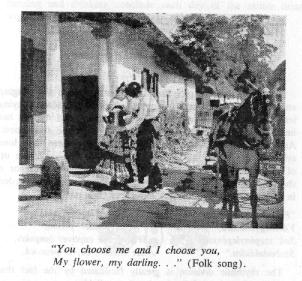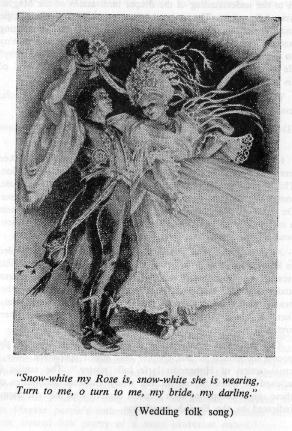| Timeless Nation |
12. THE SONG IN HIS HEART
(Lyric folk poetry and folksong)
Hungarian folk poetry is almost always connected with singing and there is hardly any folk music without an accompanying text. This inter-relationship between poetry and music has imposed its mark upon the structure of the lyric folk poem.
A breath-unit could not easily extend over more than four syllables, the basic unit of the folk poem is the line made up of four syllables, often followed by another four-syllable or a shorter unit. The first verse of an ancient folksong (recorded in Transdanubia by Bartok) illustrates the point:
"Felszallott a pava
Varmegyehazara,
Sok szegenylegenynek
Szabadulasara."
"Fly my haughty peacock
Fly to yonder prison,
Where the captives languish,
Set them free, 0 peacock..."
The rhythmic division is greatly facilitated by the fact that in Hungarian stress falls on the first syllable.
The oldest and still frequent. meter is the eight-syllable line, divided into two four-syllable units:
"Megerem meg azt az idot
Sirva megy el hazam elott…"
"I shall live to see you one day.
Pass my house bitter-weeping..."
The strophe usually contains four lines. The rhyme is arranged in couplets but it is sometimes omitted when the rhythm alone is sufficient to carry the musical frame.
The most frequent theme is, of course, love. Happy, contented love, however, rarely inspires the folk-poet. When it does, the poem is short, simple and usually made up of quick, short breath units the love of the mother and the mother’s love for her child is also a source of inspiration – a rare occurrence in folk poetry. The sorrow of hopeless love is more frequent. Often it is the peasants’ rigid moral code or the parents’ insistence on choosing their children’s future spouses, which causes the lovers’ unhappiness.

The sorrow of parting remains a recurring theme of many folk poems’ Compulsory military service in the army of the Austrian-Hungarian Monarchy, usually in some non-Magyar province of the Empire, had little appeal for the peasant boys. Emotional patriotism is a frequent motif, mostly in the context of a farewell song or with melancholic references to the Magyar people’s sufferings The two great freedom wars have created folk poetry of a more exuberant nature
The Magyar peasant loves nature, the soil, which is rarely his, the animals, which he seldom owns He envies the freedom of the birds and the color of the flowers satisfies his eternal longing for beauty. He feels that he is one with nature and the animals the billowing waves of corn and the forested hills can interpret his dreams, joys and sorrows.
The recurring reference to the phenomena of nature leads us to the understanding of the deeper motivations of the Magyar lyric folk poem. The peasant observes nature’s eternal logic and knows that the plants and animals obey the unchanging laws to love or to live. The devious tragedies of human destiny do not follow the simple’ ways of nature. So he asks: why? He becomes a philosopher and pours out the philosophy of his heart in a few moving words.
Thus his beloved river Tisza teaches him the melancholic lesson of the passing of time:
"Down went the Tisza – never shall it turn back – My Love went away – never shall she return..."
It is easier to bear his sorrow when he finds an image taken from his environment and uses it as a simile and a consolation. This is why many folk poems begin with a picture of nature, sometimes without any apparent connection with the theme. On a second look, this seemingly irrelevant image may present a surprisingly apt, symbolic parallel: "there is no forest without boughs – my heart is never without sorrows…"
About 100,000 folk poems and songs have been recorded in Magyar-speaking areas of the Carpathian basin. This incredible treasure is, unfortunately, hardly accessible to those who cannot understand the language. Folk poetry, more than any other branch of literature, loses its flavor in translation. Fortunately, there is always the melody, which offers an eloquent. Interpretation.
The Appendix contains the complete English text of the poems mentioned in this chapter and added specimens offer a cross-section of Hungarian lyric folk poetry. The reader is advised to listen to one of the many excellent recordings of these songs, comparing their musical content with the lyric theme indicated by the English translation.

| Timeless Nation |